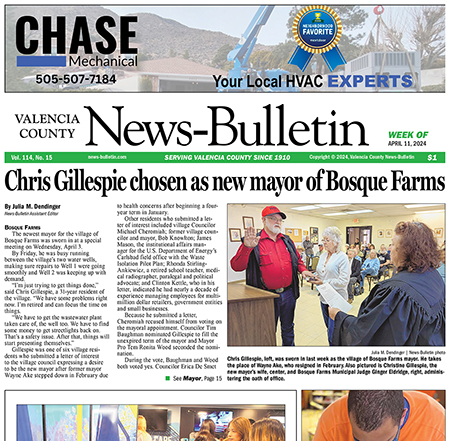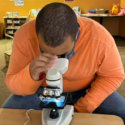The West NileVirus (WNV) hit New Mexico this week, as horses from Quay and Curry counties in the east central part of the state were diagnosed with the virus by local veterinarians.
A blood sample from the Quay County horse has already been sent to the National Veterinary Services Laboratory in Ames, Iowa, and final confirmation by the lab is expected this week. In the meantime, the horse has died.
For horses, some of the symptoms of WNV include stumbling, muscle weakness or twitching, partial paralysis, loss of appetite, lethargy, impaired vision, inability to stand and convulsions.
People who are infected may show no symptoms, or experience a mild fever or headache before recovering. Thus far, 13 people nationally have died from virus, with the most — eight — dying in Louisiana.
Rosie Clifford, public health nurse in Valencia County, said that the State Health Department is “getting the word out that the virus has arrived. We’re still collecting birds — blue jays, ravens and crows — ones that have died within the last 24 hours.
“My understanding is we’re still collecting birds because we want to see how this moves through the state. When we find it in a county, we’ll stop collecting birds.”
She said her office is working with the schools “to help them know how to advise parents about protecting their children, especially at school.
“We’re faxing everything to private doctors who need more information. We’re answering people’s calls and, for any patients who walk in, we have a three-page handout on West Nile Virus.” The information can be accessed on the Internet at www.health.state.nm.us.
Young children and the elderly, who have weaker immune systems, are at the most risk. Preventive precautions would include wearing long-sleeved shirts and long pants, along with insect repellent with no more than 35 percent DEET for adults and less than 10 percent for children. Those who need to work outdoors, where they might contract mosquito bites, need to be mindful of the risk. At home, open windows should have screens. Staying indoors at dawn, dusk and early evening would also reduce the risk.
But there’s no need to over-react. “You still much more likely to be killed by a drunk driver, but it’s something to think about,” Clifford said.
Thus far, no horses in Valencia County have contracted the virus. However, once a horse is bitten by an infected mosquito, it may take five to 15 days before the horse shows any signs of West Nile. Local animal clinics have been vaccinating horses since December.
Veterinarian Donny Mac-Dougall of Los Lunas Animal Clinic has already given more than 2,000 vaccinations to horses in Valencia County and neighboring areas. Due to the experimental nature of the vaccine, it can be administered only by a licensed veterinarian. Currently, there is no vaccination for humans, and horses and birds are the most likely animals to contract the virus.
“Almost all of the vets in the region have been giving vaccinations, because we expected it to arrive,” MacDougall said. “It takes two vaccinations, three to six weeks apart” for the vaccination to become effective.
“Birds are being tested in our state and they are showing up positive,” MacDougall said.
Birds contract the virus and are, in turn, bit by mosquitoes, who spread the virus to humans. The Rio Grande flyway for birds extends from El Paso all the way to Española.
“There are some confirmed cases in birds,” MacDougall said. “We don’t have a confirmed case in a horse in the Valencia County area.”
“It is here to stay. It’s not going to go away. Birds are the carrier, and, because of our relationship with the river, Valencia County is a high risk area because we have both carrier and the vector (mosquito).”
The vaccine is not hard to obtain. All MacDougall has to do is make a phone call, he said. Currently, he has enough to vaccinate 500 horses. Shots at the Los Lunas Animal Clinic are $22 for the first shot and $22 for the booster shot given within 30 days. It takes at least 60 days before the horse is fully immunized, according to assistant Kelly Hampton, who has worked at the clinic for the past four years and also owns four horses, which she had vaccinated in March.
At Belen’s Valencia Animal Clinic, veterinarian Brenda L. Mack pointed out that horse owners can use “any sort of mosquito repellent, but I would definitely recommend the vaccination because it takes at least six weeks to become effective. We’re just starting into our mosquito season here, and it gets worse after a rain.”
Mack advises horse owners to remove standing water where possible and do anything to help eliminate mosquitoes.
In Bosque Farms, where many residents own horses, veterinarians Mike McCallister and Diana DeBlanc of the Village Veterinary Hospital have administered more than 600 vaccinations in the past four months and currently have enough vaccine for 300 horses.
“We started recommending vaccinations in March,” said Sandra Smederovac, a registered veterinarian technician.
With WNV approaching the Rio Grande valley, residents can help the New Mexico Department of Health by reporting any unusual dead crows or jays by calling 1-800-879-3421, from 8 a.m. to 5 p.m., Monday through Friday.















